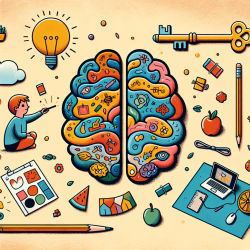Introduction: A New Avenue for Child Therapy
In the realm of speech-language pathology, innovative strategies that enhance therapeutic outcomes are invaluable. A recent study titled "Effects of Structured Expressive Writing on Quality of Life and Perceived Self-Care Self-Efficacy of Breast Cancer Patients Undergoing Chemotherapy in Central China: A Randomized Controlled Trial" sheds light on the potential of expressive writing as a therapeutic tool. While the study focuses on breast cancer patients, its implications for child therapy are profound, offering a data-driven approach to improving emotional well-being and self-efficacy in children.
Understanding Expressive Writing
Expressive writing is a psychological intervention that encourages individuals to articulate their deepest thoughts and emotions related to personal experiences through writing. This method, rooted in the theory of cognitive adaptation, has been shown to enhance quality of life and self-care self-efficacy by promoting cognitive and emotional processing of traumatic experiences.
Key Findings from the Study
- Expressive writing significantly improved the quality of life (QoL) for participants two weeks post-intervention.
- While the improvement in self-care self-efficacy was not statistically significant, the intervention showed promise as a low-cost, easily delivered method to reduce stress.
- The study highlighted the temporary nature of the benefits, suggesting the need for ongoing intervention to sustain improvements.
Implications for Child Therapy
Although the study focused on adults undergoing chemotherapy, the principles of expressive writing can be adapted for children in therapeutic settings. Here’s how practitioners can leverage these findings:
- Emotional Expression: Encourage children to express their feelings about challenging experiences, which can help them process emotions and reduce stress.
- Self-Efficacy: Use writing as a tool to boost children’s confidence in their ability to manage their emotions and behaviors.
- Adaptability: Tailor the expressive writing tasks to suit the developmental level and specific needs of each child, ensuring that the intervention is both accessible and engaging.
Encouraging Further Research
The study opens avenues for further research into the application of expressive writing in child therapy. Practitioners are encouraged to explore the following:
- Investigate the long-term effects of expressive writing on children’s emotional and behavioral outcomes.
- Examine the role of expressive writing in enhancing communication skills and language development in children.
- Evaluate the effectiveness of integrating expressive writing with other therapeutic modalities.
Conclusion: A Call to Action
As practitioners dedicated to improving child outcomes, embracing innovative, evidence-based strategies like expressive writing can make a significant difference. By fostering emotional expression and enhancing self-efficacy, we can empower children to navigate their challenges with resilience and confidence.
To read the original research paper, please follow this link: Effects of Structured Expressive Writing on Quality of Life and Perceived Self-Care Self-Efficacy of Breast Cancer Patients Undergoing Chemotherapy in Central China: A Randomized Controlled Trial.










